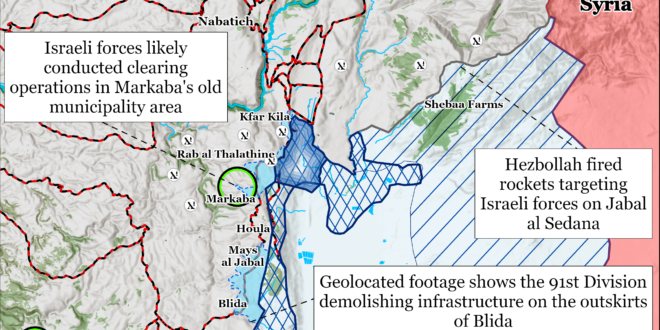Palestinian fighters killed an IDF brigade commander in Jabalia, northern Gaza Strip. Palestinian fighters recently detonated a pre-planted improvised explosive device (IED), killing IDF 401st Armored Brigade Commander Colonel Ehsan Daqsa.[i] An Israeli Army Radio correspondent reported that Daqsa is the most senior IDF officer killed in the Gaza Strip since the October 7 war began.[ii] Daqsa, the 52nd Battalion commander (401st Armored Brigade), and two other officers activated a trip wire after they moved about 20 meters from their tanks towards an observation post in Jabalia. The trip wire detonated an IED that killed Daqsa.[iii] The 52nd Battalion commander was seriously injured and the other two officers sustained light to moderate injuries.[iv] The IDF appointed 162nd Division Deputy Commander Colonel Meir Biderman as the acting commander of the 401st Brigade.[v]
Iranian Foreign Affairs Minister Abbas Araghchi met with senior Hamas leadership in Istanbul, Turkey, on October 19.[vi] Araghchi discussed recent ceasefire efforts in a meeting with Hamas’ Shura Council head Mohammad Ismail Darwish.[vii] Darwish thanked Araghchi for Iran’s continued support and stated that the Palestinian militias will continue their fight against Israel. Araghchi separately met with Hamas Deputy Political Bureau Chairman Khalil al Hayya and senior Hamas official Mousa Abu Marzouk.[viii] CTP-ISW has previously assessed that Hayya is Sinwar’s most likely successor as Hamas political leader.[ix] Araghchi stated in an interview with Turkish media following the meetings that Iran has already identified its targets in Israel for a potential retaliatory strike should Israel attack Iran.[x] Araghchi implied that Iran would only target military targets in Israel in such a retaliation. Araghchi traveled to Turkey to attend the 3+3 meeting with Russian, Turkish, Azerbaijani, and Armenian officials to discuss the south Caucasus in Istanbul on October 18.[xi]
The IDF thwarted a weapons smuggling attempt from Egypt into Israel on October 19.[xii] An Israeli Army Radio correspondent reported that the IDF intercepted a small quadcopter drone that crossed into Israel from Egypt.[xiii] The IDF reported that the drone was ferrying eight handguns and an unspecified amount of ammunition.[xiv]
Israeli Shin Bet Director Ronen Bar traveled to Cairo, Egypt, to discuss renewing hostage negotiations with incoming Egyptian intelligence chief Hassan Mahmoud Rashad on October 20.[xv]
The Israeli security cabinet convened in Tel Aviv on October 20 after the Hezbollah attack on the residence of Israeli Prime Minister Benjamin Netanyahu.[xvi] The Israeli security cabinet met in the command bunker in the Kirya instead of in its normal meeting room inside the base.[xvii] The cabinet discussed several ”sensitive issues including the Iranian issue.”[xviii] Earlier reports stated that the security cabinet was expected to discuss increasing humanitarian aid to the Gaza Strip and vote on whether to approve finding an armed contracting group to distribute humanitarian aid in the Gaza Strip.[xix] This meeting also comes as Israel continues preparations for a possible retaliation to Iran’s October 1 ballistic missile attack.[xx]
An Israeli airstrike killed three Lebanese Armed Forces (LAF) soldiers in a military vehicle on October 20 in southern Lebanon.[xxi] The LAF announced on X that the airstrike targeted an LAF vehicle on a road between Ain Ebel and Hanine in Bint Jbeil District.[xxii] Israeli Army Radio reported that the IDF confirmed that it conducted the airstrike.[xxiii] The IDF said that the Lebanese soldiers were driving in an unmarked vehicle towards an area where Israeli forces were operating and the IDF decided to strike the truck.[xxiv] The IDF clarified that “the Lebanese army and the objectives of the Lebanese state are not a target as far as we are concerned.”[xxv]
The IDF targeted and killed three senior Hezbollah officers in Tibnin, Bint Jbeil District, on October 20.[xxvi] The IDF killed a senior member of Hezbollah’s southern front headquarters Hajj Abbas Salameh.[xxvii] Salameh conducted operations in the Bint Jbeil area and has held several positions previously on the southern front.[xxviii] The IDF also killed Hezbollah radio communications expert Reza Abbas Awada and Ahmad Ali Hussein, the head of Hezbollah’s strategic weapon production unit.[xxix] The IDF said that Hussein had completed “in-depth training” in Iran.[xxx]
Key Takeaways:
Gaza Strip: Palestinian fighters killed an IDF brigade commander in Jabalia, northern Gaza Strip.
Iran and Hamas: Iranian Foreign Affairs Minister Abbas Araghchi met with senior Hamas leadership in Istanbul, Turkey, on October 19.
Weapons Smuggling on the Egypt-Israel Border: The IDF thwarted a weapons smuggling attempt from Egypt into Israel on October 19.
Ceasefire Talks: Israeli Shin Bet Director Ronen Bar traveled to Cairo, Egypt, to discuss renewing hostage negotiations with incoming Egyptian intelligence chief Hassan Mahmoud Rashad on October 20.
Hezbollah Drone Strike Targeting Netanyahu: The Israeli security cabinet convened in Tel Aviv on October 20 after the Hezbollah attack on the residence of Israeli Prime Minister Benjamin Netanyahu.
Israeli Operations in Lebanon: An Israeli airstrike killed three Lebanese Armed Forces (LAF) soldiers in a military vehicle on October 20 in southern Lebanon. The IDF said that the Lebanese soldiers were driving in an unmarked vehicle towards an area where Israeli forces were operating and the IDF decided to strike the truck. The IDF clarified that “the Lebanese army and the objectives of the Lebanese state are not a target as far as we are concerned.”
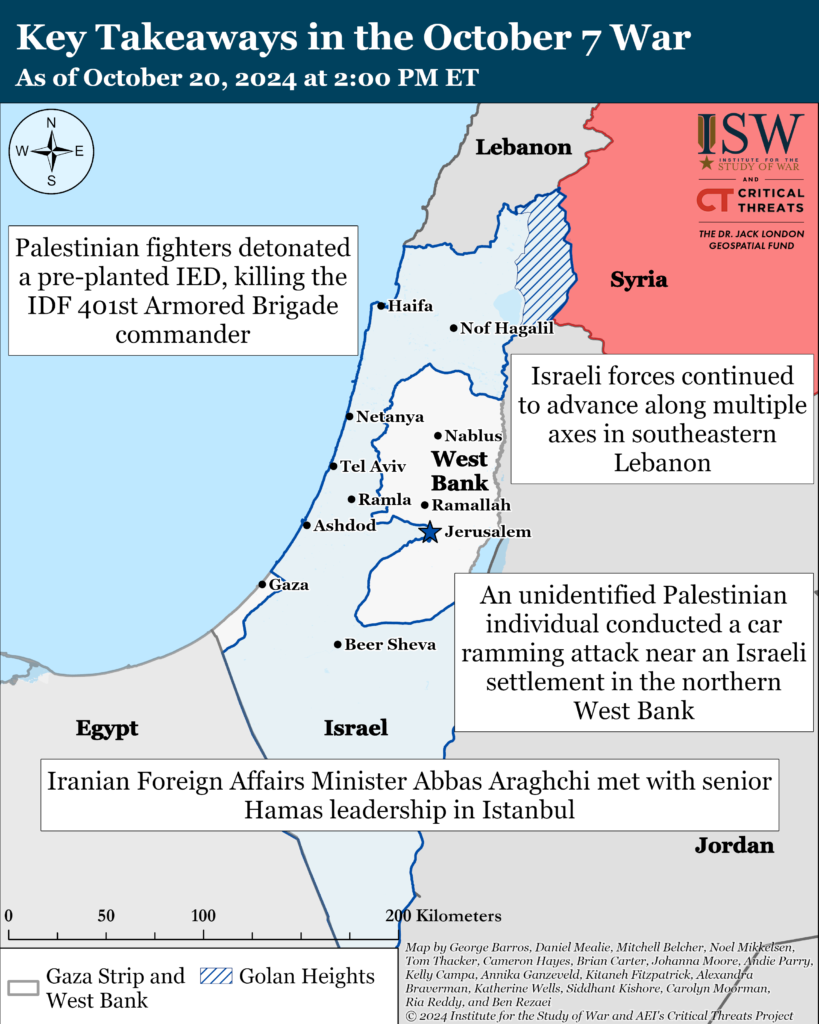
Gaza Strip
Axis of Resistance objectives:
Erode the will of the Israeli political establishment and public to sustain clearing operations in the Gaza Strip
Reestablish Hamas as the governing authority in the Gaza Strip
The IDF Air Force struck multiple militia targets in the Gaza Strip in the past 24 hours, including weapons depots, military buildings, and other militia infrastructure.[xxxi]
The IDF 162nd, 252nd, and 143rd Divisions continued operations in the northern, central, and southern Gaza Strip on October 20.[xxxii] IDF forces killed dozens of Palestinian fighters, destroyed militia infrastructure, and confiscated large quantities of weapons.[xxxiii] The 162nd, 252nd, and 143rd Divisions are currently deployed in Jabalia, the central Gaza Strip, and near Rafah respectively.[xxxiv]
Palestinian militias, including Hamas and Palestinian Islamic Jihad (PIJ), conducted multiple attacks targeting Israeli forces and armor near Jabalia refugee camp.[xxxv] Hamas detonated an anti-personnel mine and fired small arms and grenades targeting Israeli forces west of the camp.[xxxvi] PIJ mortared Israeli forces east of the camp.[xxxvii]
The IDF called the Hamas-run Gazan Information Ministry’s causality numbers from an IDF Air Force strike in the northern Gaza Strip “exaggerated and inconsistent.”[xxxviii] The Gazan Information Ministry claimed 73 Palestinians died in an IDF airstrike in Beit Lahiya.[xxxix] The Hamas-run Palestinian Health Ministry claimed around 87 Palestinians were killed or missing in Beit Lahiya due to the strike.[xl] The IDF said that a preliminary investigation revealed that the existing figures are inconsistent with the IDF’s information and the precision munitions used in the strike.[xli] The IDF said the strike targeted a Hamas asset.[xlii] Palestinian health authorities reported that Israeli forces separately fired artillery shells at a hospital northeast of Jabalia in the northern Gaza Strip.[xliii] The IDF said it operated against militia fighters near the hospital but did not intentionally direct fire at it.[xliv]
Palestinian militias fired rockets and mortars targeting Israeli forces operating along the Netzarim Corridor on October 20.[xlv] The 252nd Division operates along the Netzarim Corridor.[xlvi]
Oxfam claimed that the IDF Air Force bombed a water utility vehicle east of Khan Younis in the southern Gaza Strip on October 19, killing four water engineers and workers.[xlvii] The IDF said that Israeli forces fired an artillery shell at suspicious figures one kilometer from the border with Israel in the southern Gaza Strip but is reviewing the incident.[xlviii]
The IDF said that Israeli forces, in cooperation with the IDF Air Force, killed Palestinian militia fighters operating near Israeli forces in the southern Gaza Strip on October 20.[xlix] The 143rd Division currently operates near Rafah.[l] A Palestinian journalist reported that an Israeli military vehicle operated near the Rafah border crossing on October 20.[li] The National Resistance Brigades also mortared Israeli forces near the Rafah crossing on October 20.[lii]
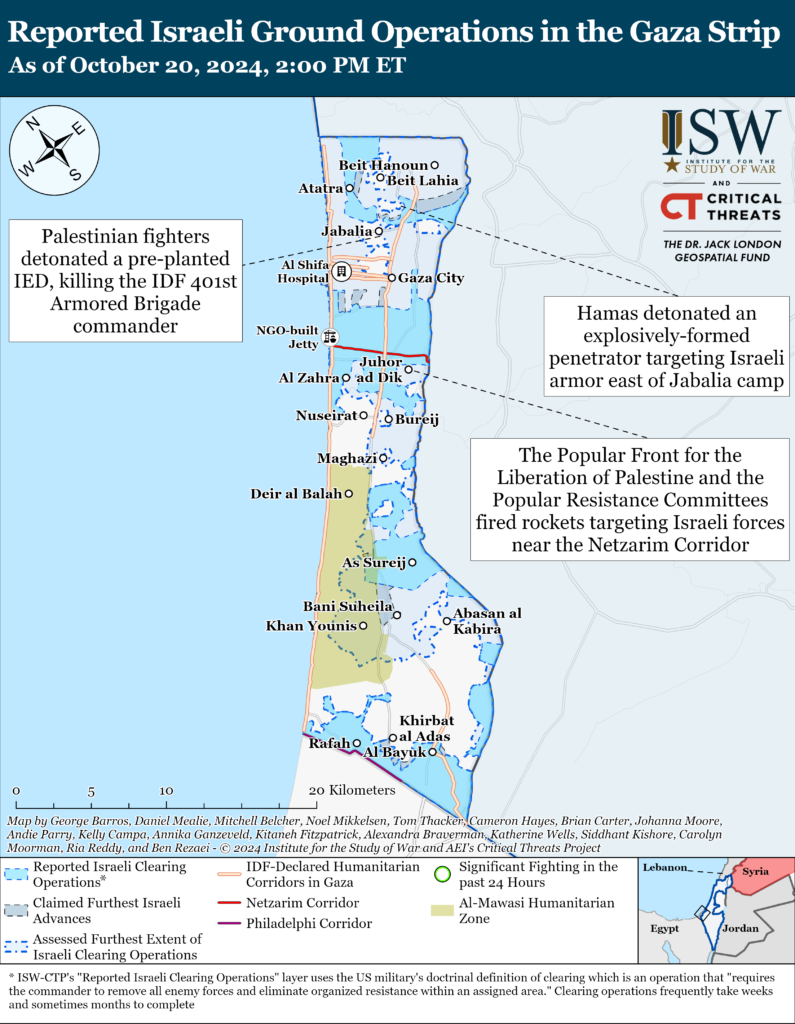
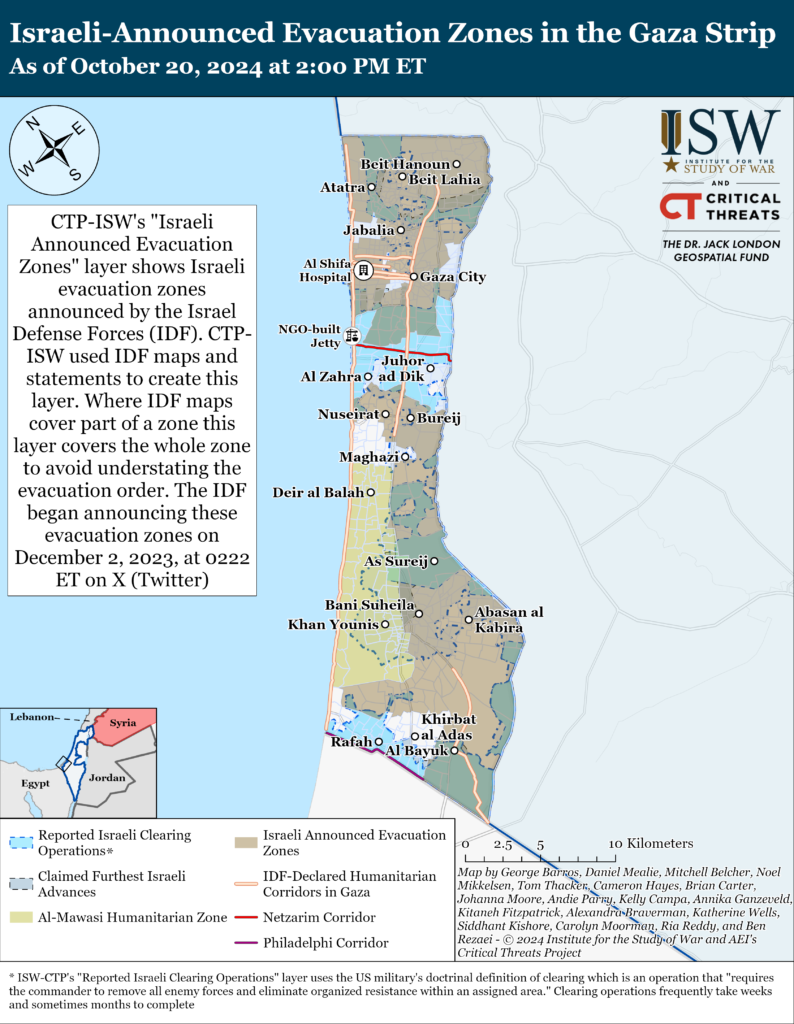
West Bank
Axis of Resistance objectives:
Establish the West Bank as a viable front against Israel
An unidentified Palestinian individual conducted a car-ramming attack near the Israeli settlement of Ofra in the northern West Bank on October 19.[liii] The Israeli Army Radio reported that the attacker rammed his vehicle against an Israeli police vehicle at the settlement entrance.[liv] Israeli forces killed the attacker and reported no Israeli casualties.[lv]
The IDF detained four armed Palestinians at a religious site near Jericho in the West Bank on October 20.[lvi] The IDF also confiscated M16 rifles and magazines from the detainees. The IDF detained the Palestinians after receiving reports of suspicious activities at Nabi Musa near Jericho.[lvii]
Israeli forces have engaged Palestinian fighters in at least two locations in the West Bank since CTP-ISW’s last data cutoff on October 19.[lviii] Palestinian Islamic Jihad (PIJ) fired small arms targeting Israeli forces operating in Jenin.[lix] The al Aqsa Martyrs’ Brigades fired small arms and detonated IEDs targeting Israeli forces operating in Balata refugee camp, Nablus.[lx] PIJ separately fired small arms targeting an Israeli civilian vehicle in an Israeli settlement of Mevo Dotan in the West Bank.[lxi]
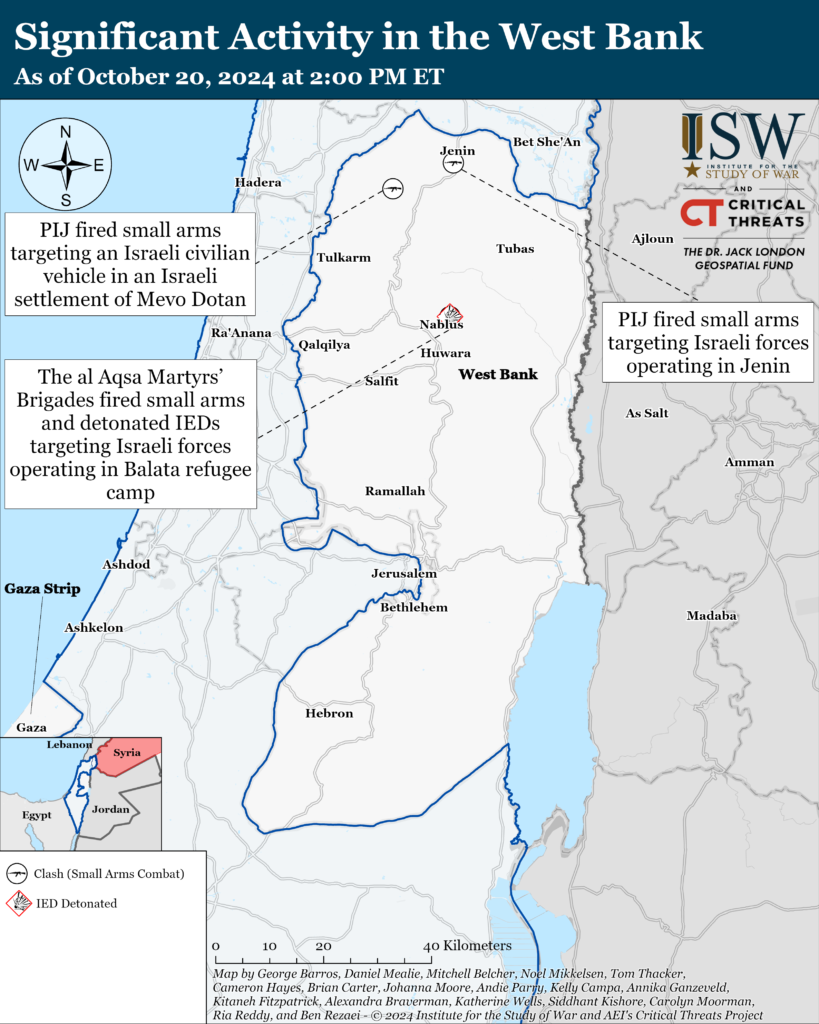
This map is not an exhaustive depiction of clashes and demonstrations in the West Bank.
Northern Israel and Lebanon
Axis of Resistance objectives:
Prepare for an expanded and protracted conflict with Israel in the near term
Expel the United States from Syria
The IDF 210th Division continued operations in Hasbaya District, southern Lebanon, on October 20. Hezbollah-affiliated media reported IDF movement on Jabal al Sedana, north of the Israeli-controlled Shebaa Farms.[lxii] Hezbollah-affiliated media also reported that Hezbollah fighters fired rockets targeting Israeli forces operating in the area.[lxiii] Lebanese sources reported that the IDF continued artillery shelling near Kfarchouba and Shebaa on October 20.[lxiv] The IDF also reportedly conducted an airstrike that severed the road between Kfarchouba and Kfarhamam.[lxv] The IDF said on October 15 that the IDF 810th Brigade (210th Division) has conducted several “targeted raids” from Mount Dov into the mountainous areas in Hasbaya District over the past two weeks.[lxvi]
The IDF 98th Division continued operations in southeastern Lebanon on October 20. Geolocated footage posted on October 19 shows Israeli forces advancing down a road southeast of Kfar Kila.[lxvii] Israeli forces killed Hezbollah fighters and located weapons caches, including grenades, Kalashnikov rifles, magazines, and other unspecified combat equipment.[lxviii] Israeli forces destroyed several launchers aimed at Israeli territory.[lxix] Israeli forces directed an airstrike targeting a cell of Hezbollah fighters that posed a threat to Israeli forces.[lxx] Hezbollah claimed four rocket attacks targeting Israeli forces operating in Markaba, including in Markaba’s old municipality in the western part of the town.[lxxi] Hezbollah also fired rockets targeting Israeli forces operating west of Odaisseh.[lxxii] The IDF directed artillery fire targeting Odaisseh, according to Lebanese sources.[lxxiii]
The IDF 91st Division continued operations in southeastern Lebanon on October 20.[lxxiv] An Israeli journalist reported that the IDF 769th Territorial Brigade demolished buildings on the outskirts of Blida from which Hezbollah planned to conduct attacks into Israel.[lxxv] Hezbollah fired rockets targeting Israeli forces in Qalaa Heights, Blida.[lxxvi] The IDF previously at least partially secured the town of Blida, demonstrated by the IDF allowing Israeli journalists to visit the town on October 10.[lxxvii]
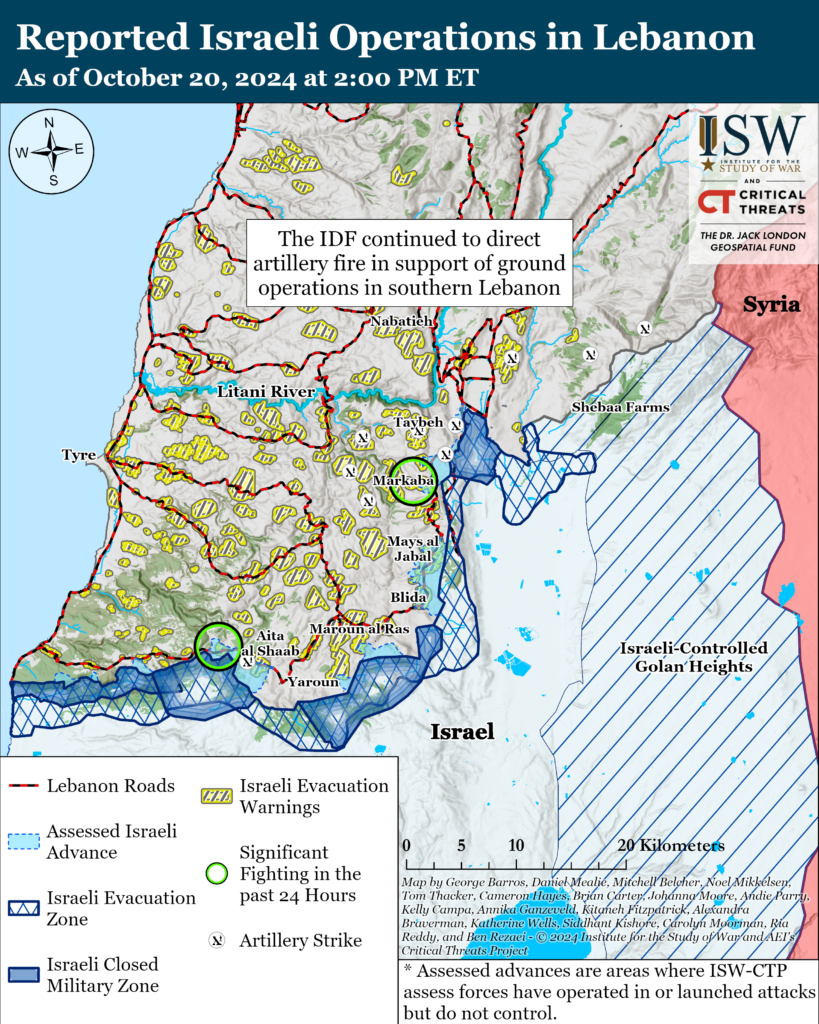
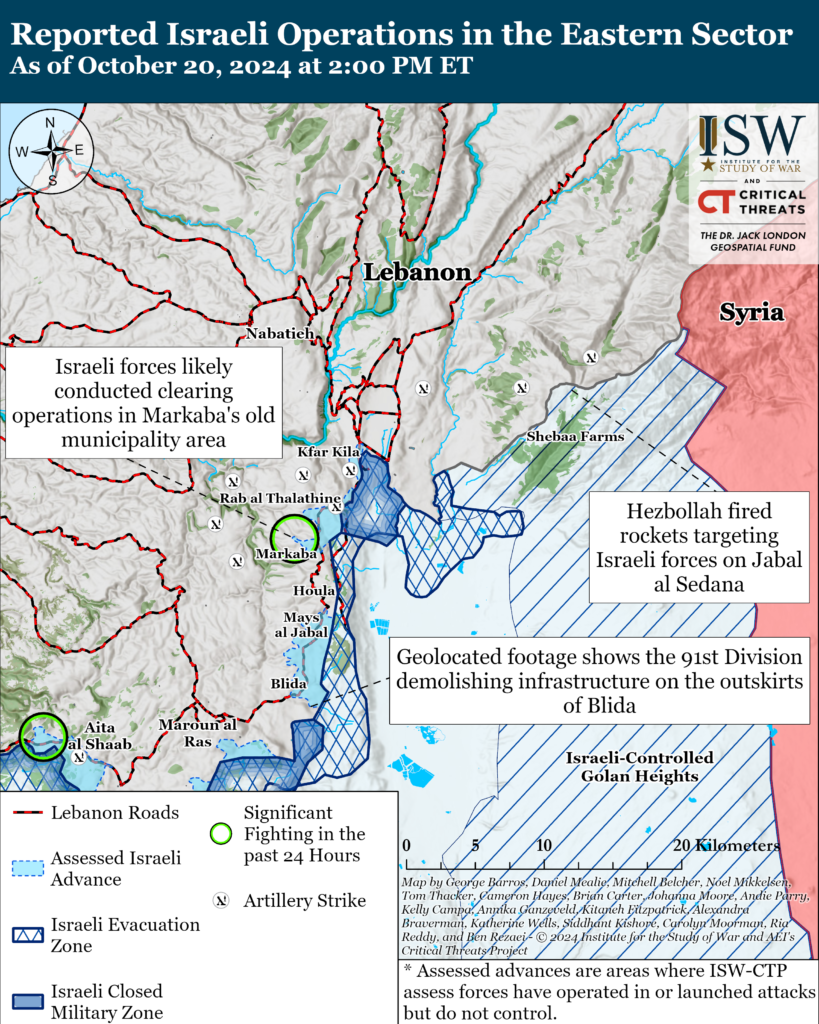
The IDF 36th Division continued to advance in Aita al Shaab and Ramyeh in southern Lebanon on October 20. Commercially available satellite imagery and geolocated footage indicate that the 36th Division expanded operations into previously-uncleared areas of eastern Aita al Shaab and advanced east along the Aita al Shaab-Rmeish road.[lxxviii] Hezbollah-affiliated media confirmed this and noted that Israeli forces engaged Hezbollah forces in eastern Aita al Shaab.[lxxix] Commercially available satellite imagery captured on October 20 showed flattened terrain and destroyed buildings north of Ramyeh, suggesting that the IDF also advanced north of Ramyeh.
The IDF 1st Infantry Brigade continued “targeted ground operations” and located Hezbollah infrastructure above and below ground, including dozens of tunnel shafts, hundreds of weapons, and documents that Hezbollah fighters “left behind.”[lxxx] The 1st Infantry Brigade and Egoz Unit fighters killed Hezbollah fighters in ground encounters and in airstrikes in cooperation with the IDF Air Force.[lxxxi] The IDF said that the 1st Infantry Brigade has killed 60 Hezbollah fighters in its operations so far.[lxxxii] Lebanese media reported airstrikes and artillery fire in the Aita al Shaab area.[lxxxiii]
Israeli forces conducted operations near Yarine, southwestern Lebanon, on October 20. Commercially available satellite imagery captured on October 20 showed flattened terrain and vehicle tracks extending from the Israeli border up to Yarine, indicating that Israeli forces operated south of Yarine. The IDF has not acknowledged operations in Yarine as of this writing.
The 146th Division continued operations in southwestern Lebanon. Israeli forces located and destroyed weapons, including anti-tank guided missiles, launchers, and ammunition.[lxxxiv] Israeli forces attacked over 100 military targets used by Hezbollah in the past day, including rigged buildings and a weapons warehouse.[lxxxv]
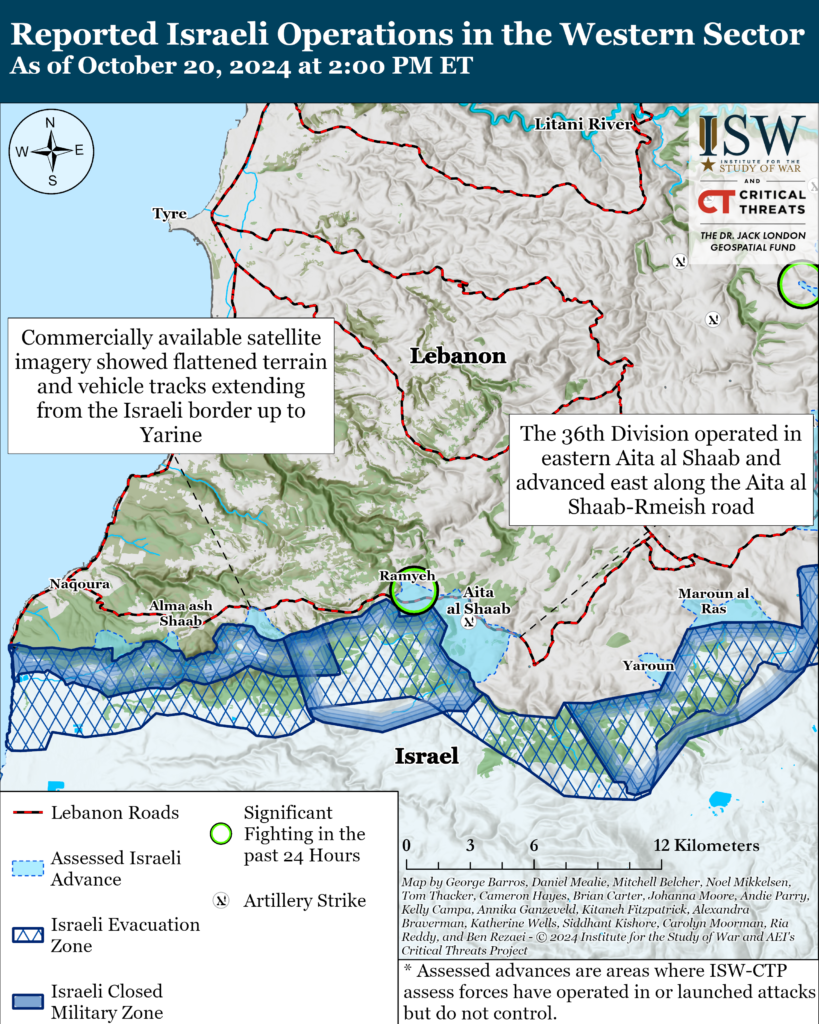
The IDF conducted multiple airstrikes targeting Hezbollah’s intelligence apparatus headquarters and an underground weapons workshop in Dahiyeh, Beirut, on October 20.[lxxxvi] Lebanese sources reported two airstrikes in the Haret Hreik and Hadath neighborhoods.[lxxxvii] The IDF said it took steps to avoid civilian harm in the attacks.[lxxxviii] US Secretary of Defense Lloyd Austin told reporters on October 19 that the number of civilian casualties in Lebanon was “far too high” and that he would “like to see Israel scale back some of the strikes it’s taking, especially in and around Beirut.”[lxxxix] US officials have repeatedly expressed concern about Israeli airstrikes in Beirut.[xc] Lebanese Prime Minister Najib Mikati said recently that the Lebanese government had received ”a sort of guarantee” from the Biden administration that Israel would curb airstrikes on Beirut.[xci]
The IDF Air Force continued to strike Hezbollah targets across Lebanon, including Hezbollah fighters, rocket launchers, and military infrastructure.[xcii] The IDF Air Force targeted over 65 Hezbollah fighters in airstrikes on October 20.[xciii] The IDF said it struck a rocket launcher that Hezbollah fighters used to fire dozens of launches at the Western Galilee earlier on October 20.[xciv] Lebanese sources reported that Israel conducted 14 airstrikes targeting al Khiam.[xcv]
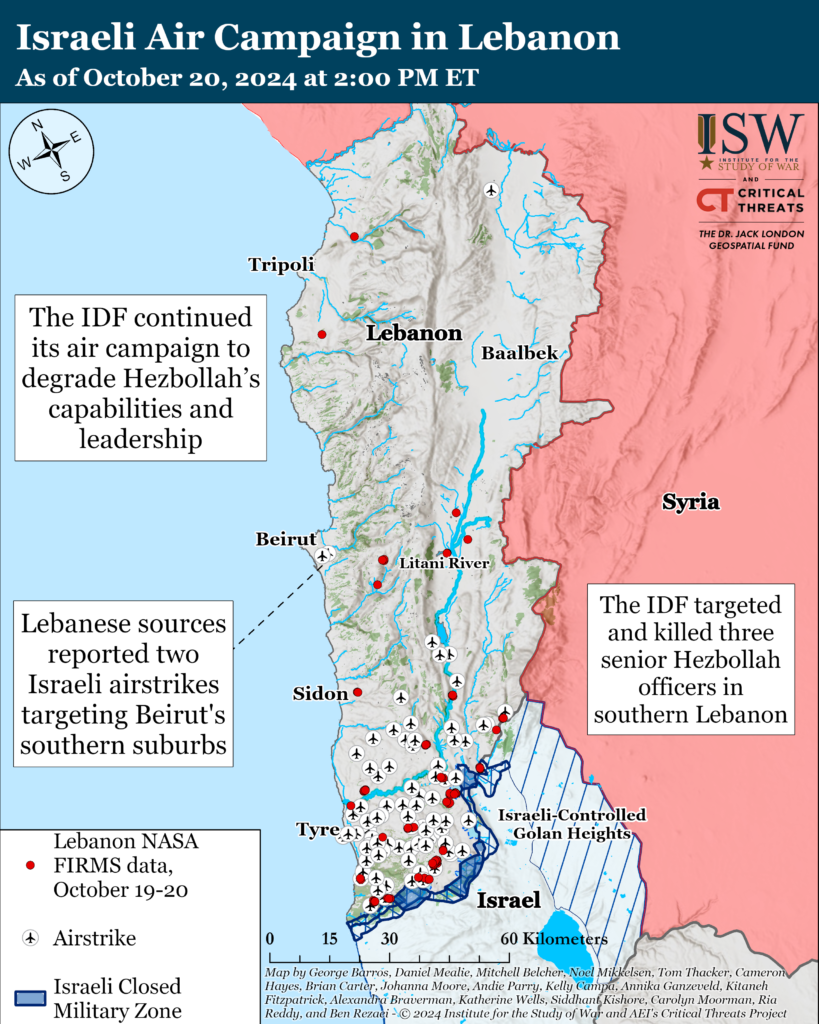
This map illustrates individual Israeli air and artillery strikes based on local Lebanese reporting. This map depicts strikes reported from 2:00pm ET on October 19 to 2:00pm ET on October 20. This map is not exhaustive. CTP-ISW cannot independently verify the locations of Israeli strikes.
Hezbollah has conducted at least 18 rocket attacks into Israel since CTP-ISW’s last data cutoff on October 19.[xcvi] The IDF announced that Hezbollah launched over 170 rockets into northern Israel on October 20.[xcvii] Hezbollah fired rockets targeting a Northern Command air defense base in Birya and an IDF base west of Lake Tiberias.[xcviii] Hezbollah also fired rockets targeting an IDF base in southern Haifa.[xcix] Hezbollah continued to target civilian sites in northern Israel, including Kiryat Ata, east of Haifa, and Rosh Pina.[c] The IDF said that Hezbollah munitions caused multiple fires in the Upper Galilee and Western Galilee.[ci] Hezbollah also continued to target IDF personnel in towns on the Israel-Lebanon border, including Manara, Adamit, and Misgav Am.[cii]
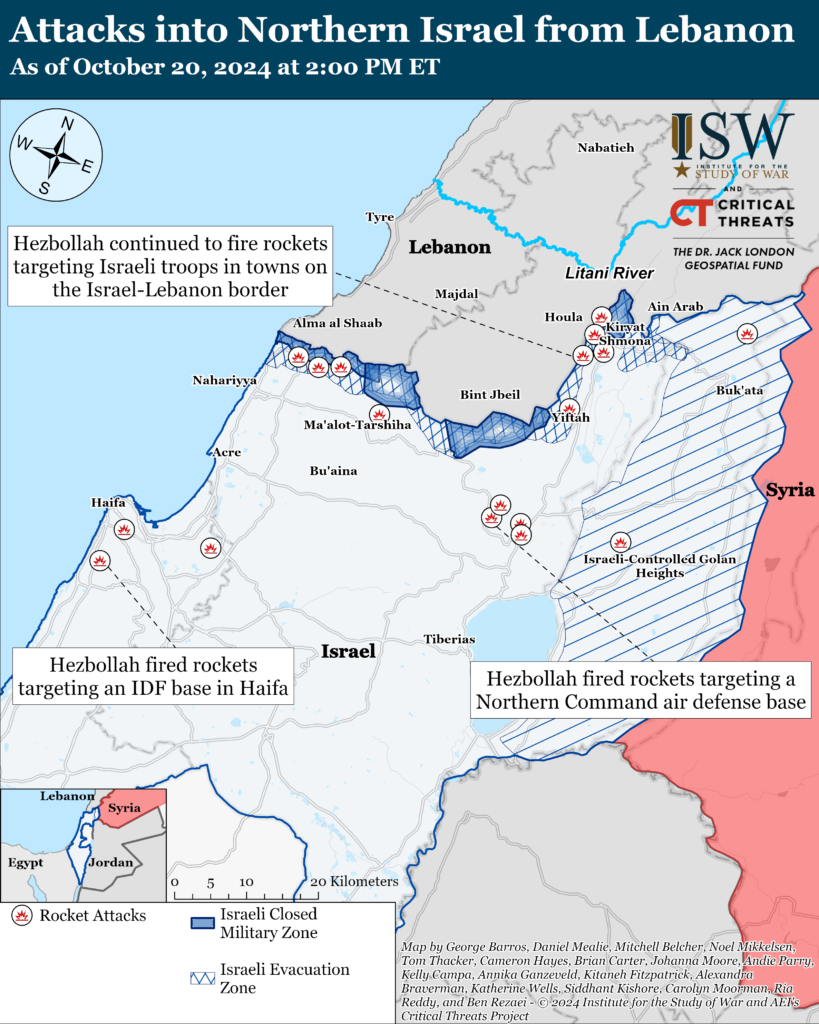
Iran and the Axis of Resistance
The Islamic Resistance in Iraq—a coalition of Iranian-backed Iraqi militias—has claimed three attacks targeting Israel since CTP-ISW’s last data cutoff on October 19.[ciii] The claims include the following:
A drone attack targeting an unspecified “vital target” in Eilat.[civ] The IDF Air Force intercepted a drone near Eilat heading towards Israel from the east before it entered Israeli airspace.[cv]
A drone attack targeting an unspecified “vital target” in the Golan Heights.[cvi] The IDF Air Force intercepted a drone in the Golan Heights that had entered Israeli airspace from Syria.[cvii]
A drone attack targeting an unspecified “vital target” in the Golan Heights.[cviii] The drone fell in an open area in the Golan Heights, causing no casualties.[cix]
Emirati-based outlet Erem News reported that Lebanese Hezbollah Deputy Secretary General Naim Qassem relocated from Lebanon to Tehran on October 5.[cx] Erem News is a UAE-based outlet run by Tajeldin Abdul Haq, a Jordanian national who has previously worked by al Sharq al Awsat and Elaph, which are both London-based outlets.[cxi] An unspecified Iranian source told Erem News that the “highest authority in Iran,” likely referring to Iranian Supreme Leader Ali Khamenei, ordered Qassem to relocate due to concerns for his safety following a series of Israeli operations targeting senior Axis of Resistance leaders including former Hezbollah Secretary General Hassan Nasrallah and his presumed successor Hashem Safi el Din in Beirut.[cxii] The Iranian source told Erem News that Qassem accompanied Iranian Foreign Affairs Minister Abbas Araghchi on an Iranian plane to Iran via Syria.[cxiii] The source stated that Qassem delivered his last two recorded speeches on October 7 and October 15 from Tehran.[cxiv] CTP-ISW previously reported that Araghchi traveled from Lebanon to Syria on October 4.[cxv] CTP-ISW cannot independently corroborate this report.
An Iranian decision to relocate Qassem would be consistent with previous Iranian efforts to convince former Hezbollah Secretary General Hassan Nasrallah to relocate to Tehran to avoid Israeli targeting. Reuters previously reported on October 4 that Supreme Leader Ali Khamenei reportedly offered to relocate Nasrallah to Tehran days before an Israeli airstrike killed Nasrallah on September 27.[cxvi]
 Eurasia Press & News
Eurasia Press & News
